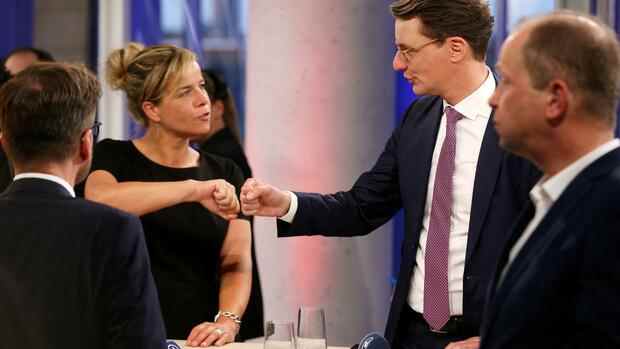Berlin So there the 191 centimeter long Munsterlander is standing in the Berlin party headquarters and is being celebrated by his national chairman. “The CDU is back in first place among the German parties,” said Friedrich Merz happily this Monday. The two are at eye level here, at least in view of their height. Two generations, one 46 years old, the other 20 years older.
“Team Wüst” and its supporters celebrated until well after midnight on Sunday at the Düsseldorf party headquarters. 35.7 percent of the votes were a sensation after the last few months. It was “a tough ride,” they said.
Armin Laschet initially chose Berlin as head of state and prime minister. After his defeat as chancellor candidate, the CDU was only 20 percent in the polls. A “risky manoeuvre” followed: 200 days before the election, the CDU swapped the prime minister and enthroned Wüst. It went well. Wüst won clearly, the SPD lost just as clearly.
As the winner of the election, he flew to Berlin on Monday, just as Daniel Günther had traveled to the federal headquarters from Kiel a week earlier. The 48-year-old had almost won the absolute majority in Schleswig-Holstein. This Tuesday he wants to talk to the Greens and the FDP about a possible alliance. Günther only needs one partner after five years of the Jamaica alliance.
Top jobs of the day
Find the best jobs now and
be notified by email.
Wüst also has to organize a new majority. After the fall of the liberals, it is no longer enough for black and yellow. Will the Greens want to rule with him? Or rather with the SPD and FDP, who lost the election, so that the traffic light flashes not only in the federal government, but also in the most populous federal state? It would be possible, the concern is for Wüst in the room. All that remains for him is the unrealistic threat of a coalition with the SPD.
The CDU wants to treat the Greens well
“My goal and my task is to form a stable government that works together reliably and trustingly on an equal footing,” said Wüst this Monday. He spoke of “respect” and “trust”, of an “alliance for the future” that “reconciles industrialized countries and climate protection”.
In the Union it was said that the Greens still remembered their time in government with the SPD. “The Social Democrats have not treated the Greens well,” it came from the CDU. The Greens would make no secret of that either. Just treating each other fairly is a plus for the CDU.
>> Also read here: The Greens after the election: Between triumph and consideration for humiliated traffic light partners
However, many compromises in terms of content should still be necessary in order to implement black-green after red-green (2010 to 2017) and black-yellow (since 2017). Wüst rejects a solar roof requirement and wants to “achieve more with incentives and acceptance,” as he explained in an interview with the Handelsblatt shortly before the election. The Greens, with top candidate Mona Neubaur, have long presented an immediate climate protection program with obligations and an express bus network.
At the same time, however, Wüst is signaling that he is accommodating: He wants to expand the use of green energy, from which farmers in his homeland make a good living. He wants local residents to participate in wind turbines and be a “pioneer of the energy transition”. “Working with coercion is not my approach and also not necessary.”
Hendrik Wüst: “A clear government mandate for the CDU in NRW”
The CDU will make compromises. After all, North Rhine-Westphalia is an important voice in the Bundesrat, which is also decisive for opposition leader Merz in the federal government. Wüst, a convinced middle-class politician, even supported a resolution of the federal party before the election: twelve euros minimum wage for everyone. “The rampant inflation makes it necessary to take this step with the wage floor,” he explained his change.
The Greens should be similarly flexible, at least they hope in the CDU and say: “The Greens are very pragmatic.” Their functionaries no longer came from the left milieu as they did twelve years ago when the first red-green alliance was formed. “Today, the Greens shape pragmatic professionals. I’m very, very confident about that,” the Union said.
Black-Green could govern NRW pragmatically
Above all, with Wüst, the Greens have a politician who was already flexible when he was Minister of Transport and who presented a cycle path expansion plan. Wüst also wanted to expand local transport. The roads need to be rehabilitated, not rebuilt. The CDU and the Greens could quickly come to an agreement.
>> See also a video here: Street survey: will NRW soon be ruled by black and green?
The coalition could be in place in the next four weeks, but first the state executives would have to appoint their negotiating teams. The committees in Düsseldorf are deciding on this these days.
The largest state association of the CDU is doing well again these days. There it was said on Monday that “the weights within the CDU would also shift”: There would no longer only be Merz, but also “two strong young prime ministers”. It doesn’t sound like coalition negotiations with the Greens could really fail.
And yet the CDU does not want to sell itself short. “In the end you have to make it clear that we have convinced twice as many people as the Greens,” said the head of the Junge Union, Tilman Kuban. “Of course, that should also be clearly reflected in the coalition negotiations, with all the compromises that have to be made.”
More: CDU in Schleswig-Holstein: This is how the People’s Party works
